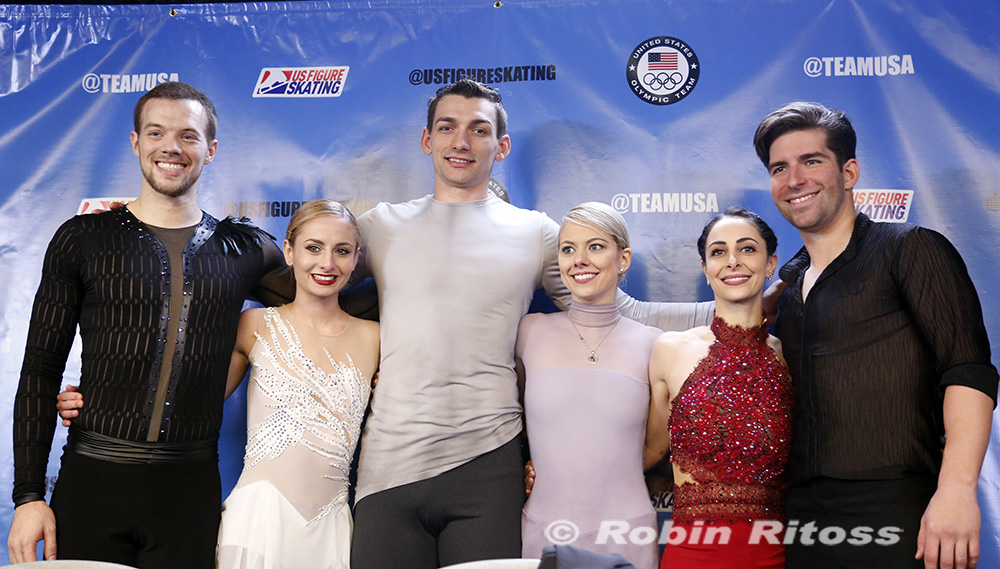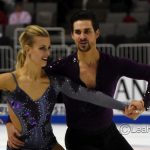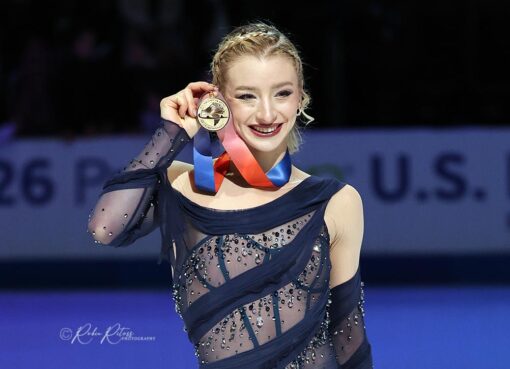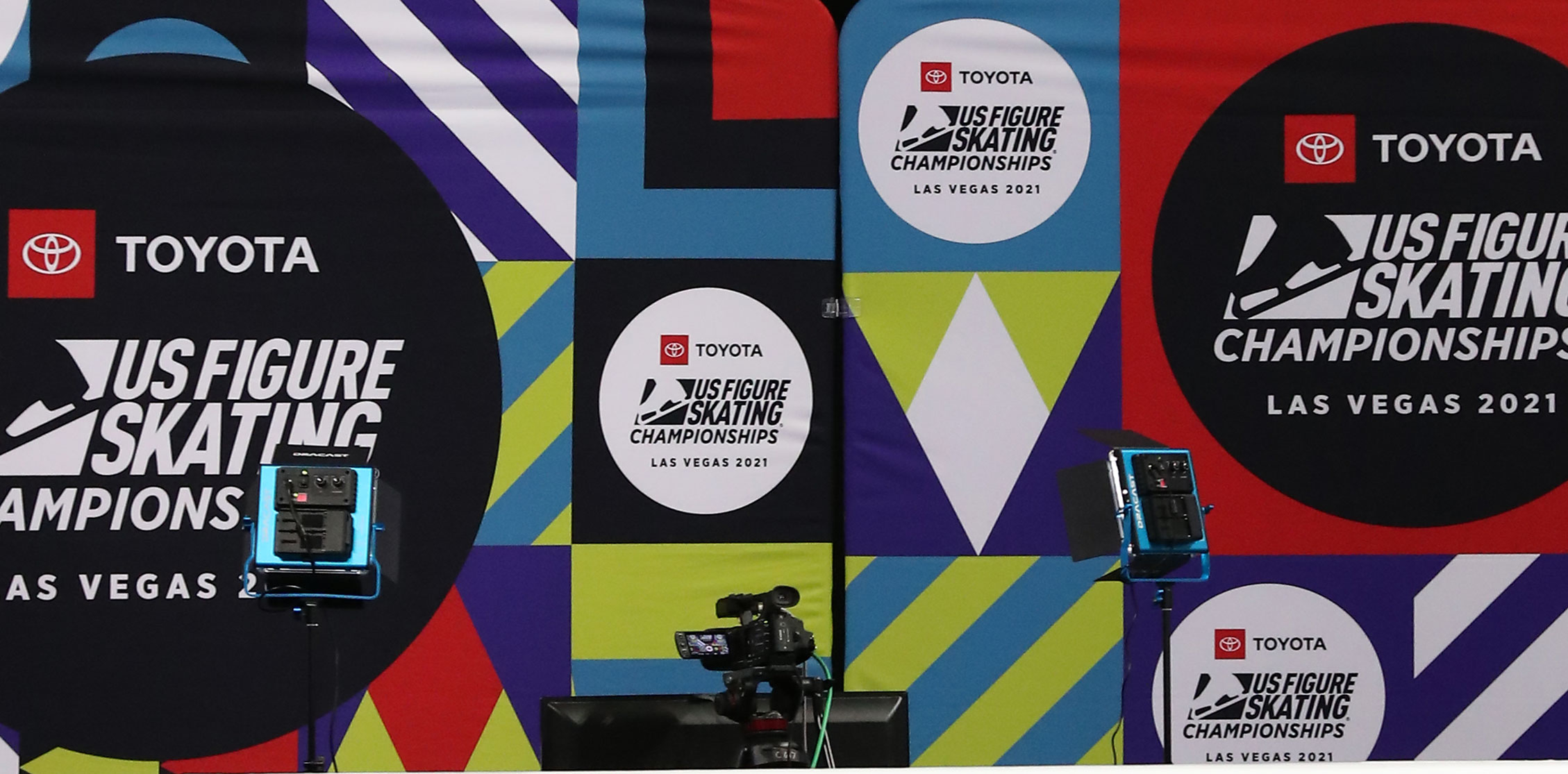Alexa Scimeca Knierim and Chris Knierim were nominated Sunday to fill the U.S. pairs slot at the 2018 Winter Olympics. It was a joy-filled moment for the couple; the other 3 U.S. pairs selected for the World Championships and Four Continents Championships were also happy with their results.
Yet, despite the pairs’ triumphs at Nationals, questions kept arising at the U.S. Championships in San Jose last week about the state of U.S. pairs skating. For the first time in almost a century, the U.S. has qualified only one pairs team to the Olympics. It’s also been 30 years since American pairs won their last Olympic medal, and 16 years since their last World medal.
In San Jose, the U.S. pair teams were asked what they need to do to contend for a medal again at Olympics or Worlds.
“Well, we have to do a lot,” U.S. champion Chris Knierim said candidly. “You’ve seen World championships come and go, and you’ve seen U.S. pairs go and compete. The [U.S.] pairs have been top 10, or just in the top 10 usually, so there’s still a long way to go. The world is moving forward, and we need to make sure that we’re keeping up. A lot of the big teams do big tricks. Which is one thing that gets talked about a lot: The quads. But I think the bigger issue is the second mark, more than the technical mark. Because I feel there are U.S. teams that can keep up technically, but it’s the second mark that kind of brings us down.”
His wife and partner Alexa Scimeca Knierim commented: “I think we have a lot of really talented U.S. pairs that can be competitive. But I think our biggest issue is our consistency among all the teams. There’s usually not that many clean skates when we go [compete] internationally, and when we do a [clean skate], it’s almost too late. I think if our teams continue to stay together, and keep having consistent, solid performances, then they’ll continue to rise in the rankings. And then we can be medal contenders.”
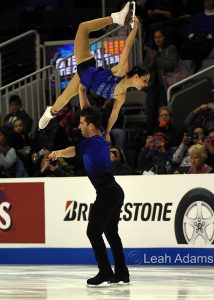 U.S. bronze medalist Deanna Stellato feels that U.S. pairs need to perform signature elements in order to stand out in an increasingly crowded international pairs field. “For me, I think with American pairs, it’s very much like running a business. I ran a business in Chicago, and I had 13 competitors in the high-rise [building] I worked in. The only way I was able to compete was to offer something that no one else was offering,” said Stellato.
U.S. bronze medalist Deanna Stellato feels that U.S. pairs need to perform signature elements in order to stand out in an increasingly crowded international pairs field. “For me, I think with American pairs, it’s very much like running a business. I ran a business in Chicago, and I had 13 competitors in the high-rise [building] I worked in. The only way I was able to compete was to offer something that no one else was offering,” said Stellato.
That’s why Stellato and partner Nate Bartholomay are going for the throw quad Salchow in their free skate. They feel it’s an element that will catch people’s eye and help raise their profile—and, ultimately, their scores. “That was the whole point. And it still is. That’s why we’re doing the quad,” said Stellato. “I feel like American [pairs] have to do more to get noticed. And that’s unfortunate, but it’s just the reality. So that’s what we’re trying to do. Otherwise, you get lost in the fray.”
Bartholomay agreed, but also echoed Knierim’s remarks on the need for U.S. pairs to grow in artistry and program components scores. “All the teams that are at the top here, we all kind of wear our emotions on our sleeves a little bit,” said Bartholomay. “And I think that for us, in the short program, that held us up in the top 3. And we carried it through our long program. So you’re going to see that develop a lot more in the next season. And that’s going to make us stand out more.”
The U.S. pairs know that it’s up to them to raise the technical and artistic level of their skating in order to become competitive on the world stage. Still, while acknowledging the need for continuing improvement, the skaters did express some dismay at the level of criticism frequently aimed at U.S. pairs.
“It is sometimes hard to deal with,” admitted U.S. silver medalist Tarah Kayne. “There is a dark rain 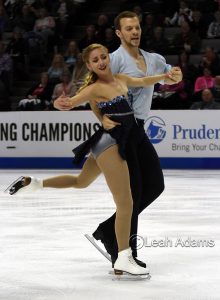 cloud over U.S. pairs. If you expect one thing, it’s going to happen. If you put a U.S. pair on the ice, and say, ‘They’re from the United States. U.S. pairs can’t do anything. They’re inconsistent, they’re whatever ….’ It’s going to take a while. People have always said U.S. pairs need to stay together. Well, we’re staying together now. [We] have teams that have been together for years. We have to prove ourselves. But I feel, sometimes, that it would also be great if people could stop counting us out before we’ve even performed.”
cloud over U.S. pairs. If you expect one thing, it’s going to happen. If you put a U.S. pair on the ice, and say, ‘They’re from the United States. U.S. pairs can’t do anything. They’re inconsistent, they’re whatever ….’ It’s going to take a while. People have always said U.S. pairs need to stay together. Well, we’re staying together now. [We] have teams that have been together for years. We have to prove ourselves. But I feel, sometimes, that it would also be great if people could stop counting us out before we’ve even performed.”
Kayne’s partner Danny O’Shea added: “We need to show consistent skating. But at the same time, if you’re counted out beforehand, there’s a lot of extra pressure …. ‘You have to be consistent NOW!” And we’ll deal with that pressure and we’ll do the best we can with it.”
“I think [U.S. pairs] need for people to stop questioning their abilities. I think that’s the biggest thing,” said U.S. pewter medalist Ashley Cain. “We can all do amazing things. This competition is so good. If you go out there—these teams are doing some of the top stuff in the whole world. Just trust in them that in the next 4 years, we’re going to work even harder to bring the abilities out and build U.S. pairs. All of us. If you look at this competition, it’s really strong. It’s fierce. I think we all want to carry that into the next 4 years.”
Scimeca Knierim said: “I used to be affected by the negative image of American pairs. But I think [about] these three teams …. I know that Tarah coming back from her injury, and Deanna coming back from a lifetime ago, and us coming back from our injuries …. The reason these three teams have come back is that we love it. That’s our soul. The three teams up here love to skate and keep pushing themselves to get better. And that’s helped me not really care any more about this stigma about American pairs. We just are all trying to do our best each day.”
Although the U.S. pairs might wish for more support at times, they also recognize that at the end of the day, people want to see results. “I don’t think people are going to really change their minds unless we get a medal again, unfortunately,” said Scimeca Knierim. “So I think the American teams are just going to keep doing our thing, and hopefully one day, we will get medals. I mean, we’ve had teams at the World Championships who’ve been top 7 or top 6 before, and it didn’t change anybody’s mind about us. I think we’re all going to just focus on ourselves and, hopefully, the world will change their opinion.
“It’s not going to stop us,” Scimeca Knierim declared.


